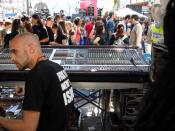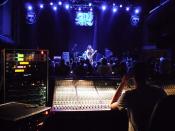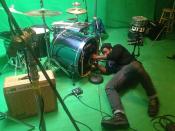The primary responsibility of a recording engineer is to operate the mixing board, multitrack recorder, and other recording equipment used during a (recording) session. The engineer is a technical specialist who is responsible for translating the artistic vision of the artists and their producer into recorded reality.
Engineers and their assistants must attend to every detail of the recording process, and decisions must be made at each step. The first task in a session is adjusting and placing microphones on the instruments to be recorded. The type of microphones used, as well as their placement, can have dramatic effects on the final recording.
Engineers then record the musicians one track at a time. After each track is recorded, the engineer plays it back to evaluate its quality. The results are often discussed with the producer and the artist(s). The engineer
then makes adjustments to the control panel (or simply encourages the artists to perform better) with intention of improving the next try.
It often requires many, many tries to get some tracks right. After all tracks have been captured on tape with a satisfactory level of quality, the engineer must mix them down to two tracks. These two tracks are then used to generate the master tape.
Engineering is a very demanding job that requires long hours of tedious and repetitive work. Engineers must have a thorough technical understanding of their equipment (including how to dismantle and repair it), as well as an aesthetic sensibility which allows them to achieve the musical goals of the artist and producer. An engineer's ability to listen to and interpret these goals technically is absolutely vital - even if he or she doesn't personally like the music. Engineers must constantly improve and expand their knowledge to keep up with the rapid rate of...


